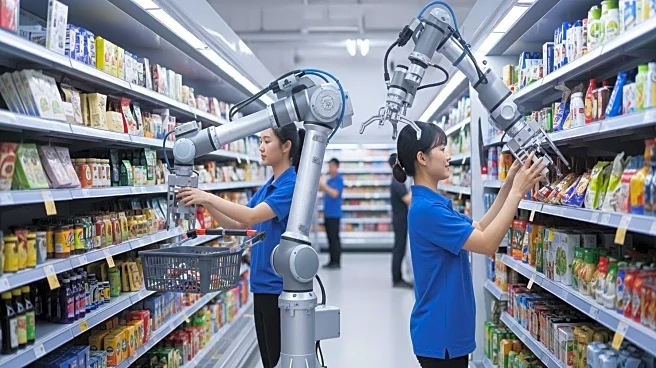What is the story about?
What's Happening?
Jennifer Conklin, Vice-President at Capgemini, is emphasizing the role of AI in grocery stores to support rather than replace human workers. Her approach focuses on user-centered design, aiming to make in-store technology intuitive and helpful. Conklin is testing AI solutions to streamline in-store fulfillment, allowing employees to manage multiple orders efficiently by mapping optimal routes through store aisles. Additionally, she is piloting voice headsets for store associates to provide instant answers and assistance, enhancing customer service. Conklin's strategy is to use AI to remove friction in workflows, making tasks quicker and more efficient, thereby allowing employees to focus on decision-making and customer interaction.
Why It's Important?
The integration of AI in grocery stores has the potential to significantly impact the retail industry by improving operational efficiency and customer service. By focusing on enhancing human roles rather than replacing them, Capgemini's approach could lead to a more personalized shopping experience, increasing customer satisfaction and loyalty. This strategy also addresses the growing demand for seamless online and in-store experiences, as AI can help bridge the gap between digital and physical shopping environments. Retailers adopting such technologies may gain a competitive edge, as they can offer faster service and more tailored shopping experiences, potentially increasing sales and customer retention.
What's Next?
As AI continues to evolve, grocery stores may see further advancements in technology that enhance both employee efficiency and customer experience. Retailers might explore additional AI-driven solutions, such as personalized product recommendations based on shopping patterns and preferences. The focus on human-centered AI could lead to broader adoption across the retail sector, with more companies investing in technologies that support their workforce. Stakeholders, including grocery chains and technology providers, will likely monitor the outcomes of these pilots to assess their effectiveness and scalability.
Beyond the Headlines
The ethical implications of AI in retail revolve around ensuring that technology enhances rather than diminishes human roles. Conklin's approach highlights the importance of maintaining a human touch in customer interactions, which could influence broader industry standards. As AI becomes more prevalent, there may be discussions around data privacy and the need for transparent identity systems to ensure accurate personalization without compromising consumer trust.















